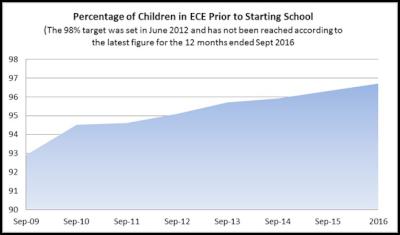Early Childhood Education target missed
Government’s 98% participation in Early Childhood Education target missed - was the effort really worth it?
3 February 2017
Press Release ChildForum
National Network
After all the effort and money spent towards getting 98% participation in early childhood education, the target has been missed, Education Minister Hekia Parata suggests.
Last year just over 96% of school starters had participated in early childhood education, according to a statement released by Ms Parata this week welcoming children to the start of the school year (press release: https://beehive.govt.nz/release/school-year-begins-over-765000-kiwi-kids )
However, 98% of school starters should have been attending early childhood education. This was a Better Public Service target that the Government said would be achieved.
There have been a number of factors in favour of achieving the target and it would be unusual for a target to be set if the Government knew it could not be met, says ChildForum chief executive Dr Sarah Alexander.
“What we know is that the participation rate was already naturally rising, more parents were making use of the 20 Hours ECE subsidy, and setting of the target fortuitously coincided with strong job growth in our economy providing parents with an incentive to use childcare and return to work before their child started school.
“Most people would think that even 90% is a high rate when participation in early childhood education is not legally required and does not come free of cost to every family.”
However, the Minister is publicly accountable for achieving the target and so perhaps questions still need to be asked.
Should the money and effort spent on the target policy be considered worthwhile? And, to what extent has the actions of the Education Minister and her Ministry perhaps prevented the participation rate from rising higher?
The Minister claimed this week that the increase in participation is because of more parents recognising the importance of early childhood education.
However, it seems that at times a coercive approach towards obtaining participation has been taken along with more money being thrown at the problem.
To help reach the target a law change made it a requirement for young children of beneficiaries to attend early childhood education, with the penalty for non-compliance being a loss of 50% of benefit money.
An ‘Early Learning Taskforce’ was established in the Ministry of Education, with its own big budget and a team of staff to engage in promotional campaigning and the targeting of families not using an early childhood service. The Ministry also paid contractors to recruit children into early childhood education, including through door knocking on family homes.
Large sums of money were made available to service providers successful in tendering to open more services and increase child places, and it did not seem to matter if there were vacancies at other perhaps high quality services nearby.
At the time the target was set in June 2012, the ECE enrolment rate was 94.9%. The latest figure for the year to September 2016 shows the numbers were falling short of the target at 96.7% and it seems unlikely that the deficit of 1.3% would have been made up within the final months of 2016.
Before 2012 the trend in participation was already upward so it is not surprising that since the target was introduced the rate has continued to increase, says Dr Alexander
In the four years since the target was set the rate has risen just under 2%. However, in the three years prior to the target being set the rate rose exactly 2%.
Dr Alexander says therefore that it would seem to be a long stretch to argue that government actions alone have enhanced the upward trend in the participation rate in any meaningful way.
“With calls for better funding of the sector overall and many teachers concerned about quality and standards, questions could be raised about whether at least some of the money spent on trying to achieve the target could have been spent elsewhere in the ECE sector and participation levels would still have risen naturally and perhaps even higher than the latest 96.7% figure.”

ends


 Race Unity Speech Awards: Students Unite As One - Speaking Up For Unity In Aotearoa - Race Unity Speech Awards And Hui 2025
Race Unity Speech Awards: Students Unite As One - Speaking Up For Unity In Aotearoa - Race Unity Speech Awards And Hui 2025 General Practice Owners Association: Government Focus On Physician Associates A Distraction From Real Issues
General Practice Owners Association: Government Focus On Physician Associates A Distraction From Real Issues HELP Auckland: Prima Facie Performance Spotlights Urgent Justice Issues For Survivors During Rape Awareness Week
HELP Auckland: Prima Facie Performance Spotlights Urgent Justice Issues For Survivors During Rape Awareness Week Royal Commission Covid-19 Lessons Learned: COVID-19 Inquiry Receives More Than 31,000 Submissions
Royal Commission Covid-19 Lessons Learned: COVID-19 Inquiry Receives More Than 31,000 Submissions NZ Principals Federation: Principals Welcome Government Teacher Registration Relief
NZ Principals Federation: Principals Welcome Government Teacher Registration Relief Yachting New Zealand: Kiwi Sailor Claims Silver In First Regatta Since Paris 2024
Yachting New Zealand: Kiwi Sailor Claims Silver In First Regatta Since Paris 2024